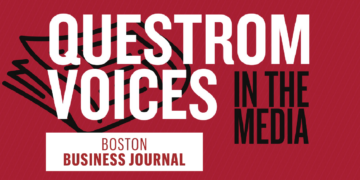When it comes to the best pitches and persuading an audience, there are some common threads, says Gregory Stoller, senior lecturer of strategy and innovation at Boston University Questrom School of Business. Stoller heads case competition prep and is actively involved in building entrepreneurship and international business at the school. He is also a contributor and periodic co-host of the broadcast Radio Entrepreneurs and co-creator/host of the nationally aired television show the Language of Business. If the results of recent case competitions are any indication, simulations of real business issues—he’s got the right formula. Boston University Questrom School of Business has been crushing it in recent years. In 2018, Questrom students finished in the top three places in 15 of the 20 competitions they took part in.
HOW TO PREPARE AN AWARD-WINNING PITCH:
PREPARE UNTIL YOU’RE SICK OF IT “It may sound hackneyed, but the more students prepare, the better they’ll do. Deepening their analysis, drilling down as far as they absolutely can, until they hit the ‘business metric oil,’ so to speak.” In other words, prepare until you know every detail of your material, and every possible question that might be asked.
THINK ABOUT YOUR AUDIENCE—AND THEIR SHORT ATTENTION SPANS “In the age of cell phones, people are always checking something, almost as a nervous tick. You have to assume they have a three-minute attention span. So, they have to know exactly what your pitch is about after three minutes.”
ANNEX WHAT YOU CAN’T FIT IN Stoller’s secret weapon is to make the last slide an appendix, to include what you can’t say in person. “No one will address 100 percent of people’s questions,” he says, “but if the last slide is an appendix with links, the judges are going to say, ‘Wow, this team really prepared.’”
GET TO THE POINT—AND THEN SAY IT AGAIN “Be clear. Be succinct. Be persuasive. What people forget is that nobody wants to hear a huge preamble. Don’t say, ‘Because of A, B, C, D, E, F, G, and H…’ People want to hear the meat. Tell people what you want to tell them, and then remind people of what you just told them.”
Learn more about harnessing your powers of persuasion from Greg Stoller and other Questrom School of Business experts: Be More Persuasive: Research Is Finding New Ways To Convince Customers—And Coworkers—That They Need To Buy What You’re Selling.


























